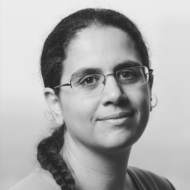About
Appointed Canada CIFAR AI Chair – 2023
Sivan Sabato studies the statistical and algorithmic foundations of machine learning, focusing on interactive machine learning. This area of research studies making inferences and predictions from data when the data collection is done during the learning process and is controlled by the learning algorithm. For instance, an algorithm aimed at calculating a prediction model based on lab experiments can direct the lab equipment to run certain experiments based on the results collected so far, so as to get the most accurate predictive model. One of the greatest challenges in this field of research is developing methods to decide which information should be collected. These methods must collect the most useful observations, while avoiding possible biases that can be caused in the process. Sabato addresses this and other challenges using a combination of tools from computer science, statistics and mathematics.
Awards
- Best student paper award (co-author), International Conference on Data Mining (2018)
- Alon scholarship for excellent young faculty, The Israeli Council for Higher Education (2015)
- Google Anita Bork Memorial Scholarship (2011)
- Adams Excellence Scholarship, Israel Academy of Science and Humanities (2008)
Relevant Publications
- Azabou, M., Xie, X., Zheng, Y., & Smith, J. (2024). A unified, scalable framework for neural population decoding. Advances in Neural Information Processing Systems, 36.
- Kalajdzievski, D., Mao, X., Fortier-Poisson, P., Lajoie, G., & Richards, B. (2023). Transfer entropy bottleneck: Learning sequence to sequence information transfer. Transactions in Machine Learning Research.
- Zadort, A., Patel, R., Kumar, S., & Garcia, M. (2023). Toward next-generation artificial intelligence: Catalyzing the NeuroAI revolution. Nature Communications, 14, 1597.
- Pogodin, R., Cornford, J., Ghosh, A., Gidel, G., Lajoie, G., & Richards, B. A. (2023). Synaptic weight distributions depend on the geometry of plasticity. In The Twelfth International Conference on Learning Representations.
- Agrawal, K. K., Mondal, A. K., Ghosh, A., & Richards, B. (2022). α-ReQ: Assessing representation quality in self-supervised learning by measuring eigenspectrum decay. Advances in Neural Information Processing Systems, 35, 17626-17638.
- Richards, B. A., Lillicrap, T. P., Beaudoin, P., Bengio, Y., Bogacz, R., Christensen, A., … & Kording, K. P. (2019). A deep learning framework for neuroscience. Nature Neuroscience, 22(11), 1761-1770.
